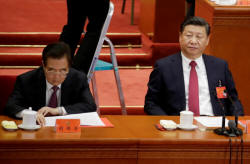Analysis-China regulatory storm tests nerves, limits of top-down policy
 Send a link to a friend
Send a link to a friend
 [August 11, 2021] By
Andrew Galbraith [August 11, 2021] By
Andrew Galbraith
SHANGHAI (Reuters) - The regulatory storm
that washed billions from Chinese corporate valuations in the name of
curbing excesses exposes not only the policy risk under President Xi
Jinping's increasingly activist tenure, but also the uncertainty over
implementation.
Xi's campaign to clamp down on industries ranging from internet
platforms and bitcoin to ride-hailing giant Didi Global and tutoring
marks a historic shift as he prioritises broad-based prosperity over the
all-out growth pursued for decades by China.
The furious pace of new rules and regulations, and the blunt and
sometimes unpredictable force with which they are being implemented in
the world's second-biggest economy have roiled companies and markets.
Investors should brace for more, analysts say.
"The difference is that campaigns under previous leaders were not nearly
so effective," said Richard McGregor, senior fellow at the Lowy
Institute in Sydney and author of a prominent book on China's ruling
Communist Party. "Xi, however, is far more powerful. When he launches a
campaign, it is implemented zealously by officials, and the fallout is
global."

A popular saying when Xi's predecessor Hu Jintao was in power was:
"Policies do not go beyond Zhongnanhai," the leadership compound in
central Beijing.
It was quoted in a 2014 People's Daily commentary that took direct aim
at Hu's comparatively ineffectual reputation, while noting another
Chinese saying: "Sunny policies from the centre turn cloudy in the
regions, turn rainy in the counties and drown the villagers".
Xi, by contrast, is widely seen as China's most powerful leader since
Mao Zedong, which analysts say fuels an ardour for implementation and
amplification by China's sprawling bureaucracy. It can also carry a risk
of overzealous execution as lower-level officials aim to please their
higher-ups.
Last week, jittery investors dumped shares in vaping firms, chemicals
makers, growth hormone stocks and distillers as they pored over state
media stories and government websites for clues to the next target of
government action. That came after a state media story labelling online
games "spiritual opium" triggered a sector sell-off, even though no
rules had changed.
FIGURING OUT POLICY
The crackdown on Didi over data security came just days after its New
York share sale, underlining the regulatory uncertainty. The move
stunned investors, and several listing hopefuls set aside their plans to
go public outside China as they tried to figure out whether they were
allowed to do so.
By comparison, the tougher-than-expected rules that have devastated the
for-profit tutoring sector include specifics but first came to light in
a document that circulated on social media for a day before they were
confirmed by state media, sending share prices reeling.
The tutoring clampdown led education authorities in the city of
Huangshan last month to raid a high-end villa to catch a teacher in the
act of illicit instruction. The National Office Against Pornography and
Illegal Publications said a number of local branches in Hubei province
had also joined the crusade, which was seen by some online as an insult
to the tutoring profession.
Victor Shih, associate professor at the University of California, San
Diego, said that the top-down approach has sidelined consultations that
took into account input from state-owned enterprises, relevant
ministries and experts.
[to top of second column] |

Chinese President Xi
Jinping (R) and former President Hu Jintao attend the closing
session of the 19th National Congress of the Communist Party of
China at the Great Hall of the People, in Beijing, China October 24,
2017. REUTERS/Jason Lee/File Photo

"Today you still have this consultative process, but one gets the sense that
it's a lot faster," said Shih.
"The flip side of having faster policy making is that there could be big
surprises to stakeholders, and that polices may be made without considering the
medium-term interests of the stakeholders."
When China clamped down on bitcoin miners this year, it left provincial
governments to take the lead, prompting industry participants in Sichuan, lured
there by local incentives to use otherwise-wasted rainy season hydropower, to
complain of policy inconsistency.
Winston Ma, an adjunct professor at NYU Law School, said investors became
complacent.
"Some foreign investors didn't take China's legislature seriously. They thought
regulations wouldn't come out any time soon, and even if they come out, they
won't be strictly enforced," he said.
Fitch Ratings said on Tuesday that China will face growing demands to "sequence
and communicate policy shifts in a manner that provides certainty and confidence
to commercial stakeholders, while minimising economic disruption."
"A blunt policy execution and communications strategy could alter the regulatory
risk premium that global investors require for investing in Chinese securities,"
it said in a note.
SELF-AWARENESS
Chinese authorities have indicated awareness of the impact of heavy-handed
implementation.
Following the sell-off sparked by the ban on for-profit tutoring, the China
Securities Regulatory Commission met with executives of global investment banks
to try and soothe nerves.
Recently, the Politburo announced plans to correct "campaign-style"
carbon-reduction efforts by local governments.

Yuan Yuwei, portfolio manager at Hangzhou-based Water Wisdom Asset Management,
said he has been surprised by the speed at which Beijing has reversed course,
which contrasts with a record of being slow to adjust for unwanted outcomes.
"Starting in March, there was a big leap forward in carbon reduction, triggering
a surge in commodity prices. The mistake has been quickly addressed," he said.
"Concentrated power works as long as there's a speedy self-correction system.
But there will be trouble if the self-correction process slows," he said.
(Reporting by Andrew Galbraith; Editing by Tony Munroe and Raju Gopalakrishnan)
[© 2021 Thomson Reuters. All rights
reserved.] Copyright 2021 Reuters. All rights reserved. This material may not be published,
broadcast, rewritten or redistributed.
Thompson Reuters is solely responsible for this content. |